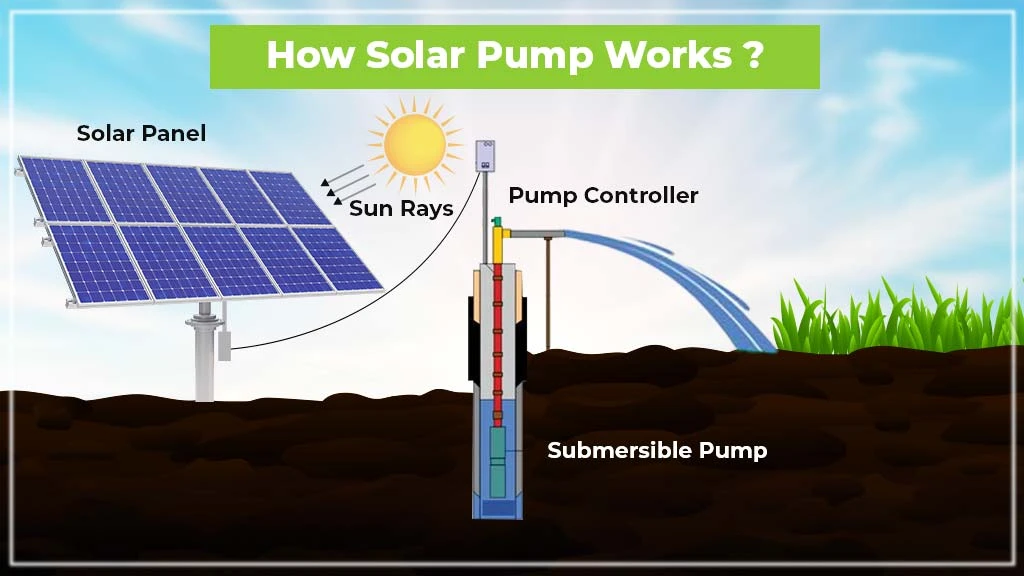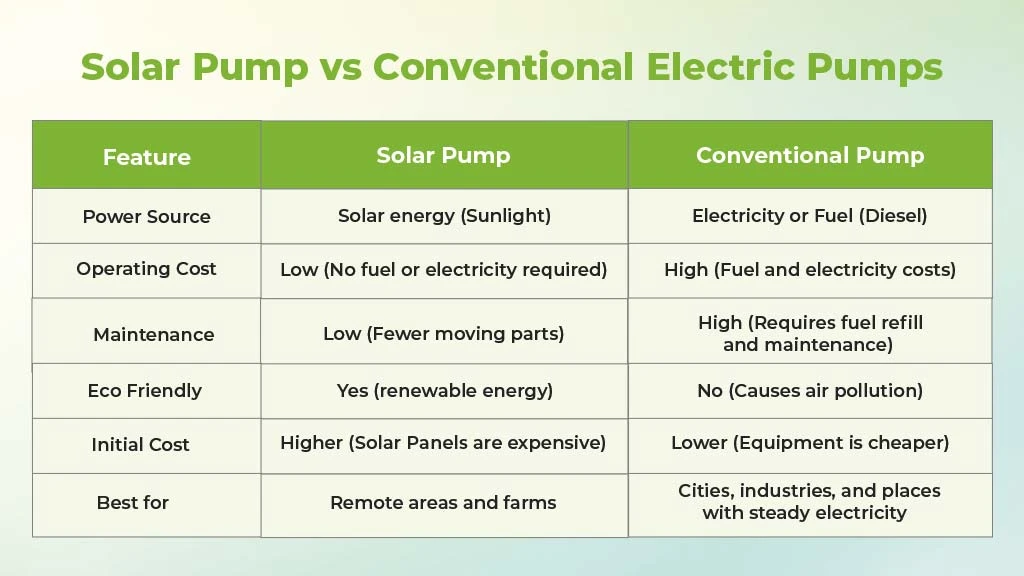Green Energy for Green Fields: Solar Pumps in Indian Agriculture

Table of Contents
- What is a ‘solar pump’ and how does it work?
- Benefits of a solar pump for agriculture
- Different types of solar pumps for irrigation
- How to Choose the Best Solar Pump
- Solar Pump Price
- Best Location to Install Solar Pumps & Panels
- Solar Pump vs Conventional Electric Pumps – Which one is better?
- Do Solar Pumps work in all seasons?
- Disadvantages of Solar Pumps
What is a ‘Solar Pump’ and how does it work?

A solar water pump system is an electrical pump system that gets its power from one or more Photo Voltaic (PV) panels. A typical solar-powered pumping system includes a solar panel system that powers an electric motor, which then powers surface pump. Solar pumps provide farmers with a more environmentally friendly method of extracting groundwater. These pumps use solar PV panels to convert sunlight into power, removing the need for traditional fuel or electricity. As India moves toward renewable energy, it is estimated that by 2040, over 49% of the country’s total energy will come from sources like solar power. This shift makes solar pumps important for the future of Indian agriculture.
Solar water pumps run on direct current (DC) from solar panels. This makes them efficient even in low light without overheating. Low-volume pumps are designed to seal water in cavities and push it upward, ensuring a steady flow. Even when sunlight is limited, these pumps maintain their lifting capacity, making them reliable for various water needs.
Benefits of Solar Pump for Agriculture
Solar Pumps have several benefits when compared to commercial pumps. Some of these benefits include:
Cost-Effective solution
Solar pumps harness free solar energy, minimising reliance on power or diesel. These pumps are long-lasting and require little maintenance. It is a purchase that has minimal long-term maintenance costs.
Eco-Friendly & Sustainable option
Solar Pumps create low carbon emissions making them an environmentally friendly alternative. This can reduce air and noise pollution compared to diesel pumps.
Ideal for Remote & Rural Areas
It is an option that works best in areas with no electricity access, benefiting farmers in remote area. It provides a consistent water supply for agriculture and drinking purposes.
Government Subsidies & Support Provided
The Indian government offers subsidies and financial aid which makes solar pumps affordable for small and marginal farmers.
Different types of Solar Pumps for Irrigation
Primarily, there are four types of Solar Pumps available in the market:
- Surface Pumps
- Submersible Pumps
- DC Pumps
- AC Pumps
Surface Pumps
Surface water pumps are a popular alternative for a variety of water pumping applications, including irrigation and domestic water supply. These pumps are usually installed in areas where the water table is less than ten meters deep, such as ponds and reservoirs. It is the most preferred method of supplying water, particularly in isolated places where electricity is limited.
- Suitable for shallow water resources.
- Idea for drip irrigation and livestock watering.
Submersible Pumps
A submersible pump is a water pump that is positioned deep beneath the ground and completely submerged in water. These pumps are put in areas where the water level is more than ten meters deep. The electric motor utilised in the process has been completely sealed and tightly connected to the pump. These pumps are installed by digging a borewell or a hole under the ground.
- Designed for underwater usage (water wells or borewells)
- Suitable for deep well irrigation and rural water supply.
DC (Direct Current) Pumps
These pumps use direct current motors; thus, no battery or inverter is required. They are typically used in applications that demand lower flow rates or pressure outputs. Smaller-scale applications for DC solar pumps include home water supply and livestock management. They are efficient, dependable, and affordable, making them an excellent choice for off-grid water pumping needs.
- Runs on direct current (DC) from solar panels.
- Saves electricity by not using an inverter
AC (Alternating Current) Pumps
These solar pumps use alternating current (AC) rather than direct current (DC). This means that the inverter converts the direct current generated by solar panels to alternating current (AC). AC solar water pumps are widely used in agriculture, irrigation, and water delivery systems, and they provide dependable, cost-effective, and environmentally friendly water pumping solutions. However, one downside of using AC solar pumps is that converting electricity from DC to AC causes power loss between generation and consumption.
- Requires an inverter to convert DC power to AC.
- Works for both shallow and deep wells making it a versatile option.
How to Choose the Best Solar Pump
If you're planning to invest in a solar pump, here are some important factors to consider:
Water Source: Choose whether you require a surface pump (for lakes, ponds, or rivers) or a submersible pump (for deep wells or boreholes).
Water Requirement: Consider how much water your crops require each day. Small farms can function with DC pumps however large farms may require AC pumps.
Solar Power Availability: Examine the sunlight conditions in your area. At the end of the day, any Solar Pump you invest in is dependent on the availability of sunlight. As a result, make sure you invest in a solar pump only after you have determined where you are going to install your solar panels.
Budget and Subsidies: Determine your budget and look at any government subsidy opportunities to cut costs.
Once you consider all these factors you can select a cost-effective and efficient solar pump that meets your agricultural needs.
Solar Pump Pricing
The cost of solar power depends on the capacity and type of solar pump you install. We've included a table below that shows the prices of all the different types of solar pumps available based on their capacity.
|
Horse Power (HP) |
Price |
|
3 HP AC Solar Pump Set System |
INR 3,20,360 |
|
5 HP AC Solar Pump Set System |
INR 4,90,000 |
|
3 HP DC Solar Pump Set System |
INR 3,84,000 |
|
5 HP DC Solar Pump Set System |
INR 5,40,000 |
If you’re looking to install solar pumps on your farmland, the government offers a variety of schemes and programs such as the ‘Pradhan Mantri Kisan Urja Suraksha evam Utthaan Mahabhiyan’ (PM-KUSUM) Scheme. Launched in March 2019 the program provides farmers with affordable and accessible sustainable energy across the country. The primary goals of the PM KUSUM Scheme are to encourage usage of renewal energy-based solutions, reduce dependency on diesel for irrigation, improving farmers income by reducing cost and reducing greenhouse emissions. These benefits promote sustainable agriculture at large.
Best Location to Install Solar pump & Panels
The most important aspect of solar energy is understanding how to properly position your solar panels and solar pumps. To ensure that your solar pumps perform efficiently place your solar panels in an area with plenty of sunlight and exposure. The place of installation should be shade-free, with no dust or dirt, and with low instances of bird droppings, as these can interfere with the workings of solar panels. Avoid sloped land because it can reduce panel efficiency and installation ease. The pumps must be located near the solar panels, but also near the irrigation area. If there are many water sources nearby, choose the one with the highest water level to place the pump.
Solar Pump vs Conventional Electric Pumps – Which one is better?
Pumps are an essential tool in the agriculture sector, primarily used for water supply on a large scale. They help move water from one place to another at a faster rate, making tasks such as irrigation much easier. However, the type of pump used can make a huge difference in cost, efficiency, and environmental impact. The two main types are solar pumps and conventional pumps. The choice of pump depends on your needs and location. If electricity is readily available and affordable, then conventional pumps are the best choice. However, in rural areas where there is plenty of sunlight, a solar pump can be a great investment.
Do the Solar Pumps work in all seasons?
Yes, Solar pumps can work in all seasons however, their efficiency heavily depends on sunlight. They perform best in summer when sunlight is strong. During monsoons and winter (or during the rainy season), cloudy weather power generation could face disruption. Most modern solar pumps have battery backups or can be connected to the grid for continuous operation. In regions with good sunlight throughout the year, solar pumps remain a reliable and cost-effective option.
Disadvantages of Solar Pumps
Solar Pumps are a great alternative to conventional pumps. However, they also have their own drawbacks. Here are some of the disadvantages of installing Solar Pumps:
High Initial Cost: Solar Panel installation is expensive which can make the initial investment higher than buying conventional pumps.
Complete dependency on the weather: Solar Pumps work exclusively through solar panels which require sunlight. During the rainy season, fog or cloudy weather efficiency can be affected.
Requires land – Solar panels require space for installation, which might not be readily available or would require another huge investment.
Difficult repair – If solar panels get damaged or malfunction, they require a specialist or technician, which can be difficult to find, especially in rural areas.


Related Blogs












